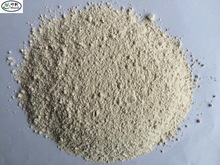Bentonite is an absorbent aluminium phyllosilicate clay consisting mostly of montmorillonite.
The different types of bentonite are each named after the respective dominant element, such as potassium (K), sodium (Na), calcium (Ca), and aluminium (Al). Experts debate a number of nomenclatorial problems with the classification of bentonite clays.
Bentonite usually forms from weathering of volcanic ash, most often in the presence of water. However, the term bentonite, as well as a similar clay called tonstein, has been used to describe clay beds of uncertain origin. For industrial purposes, two main classes of bentonite exist: sodium and calcium bentonite. In stratigraphy and tephrochronology, completely devitrified (weathered volcanic glass) ash-fall beds are commonly referred to as K-bentonites when the dominant clay species is illite. In addition to montmorillonite and illite another common clay species that is sometimes dominant is kaolinite. Kaolinite-dominated clays are commonly referred to as tonsteins and are typically associated with coal.
Main sizes 150 mesh and 1-4mm
Bentonite for Drilling mud
Bentonite is used in drilling fluids to lubricate and cool the cutting tools, to remove cuttings, and to help prevent blowouts. Much of bentonite's usefulness in the drilling and geotechnical engineering industry comes from its unique rheological properties. Relatively small quantities of bentonite suspended in water form a viscous, shear-thinning material. Most often, bentonite suspensions are also thixotropic, although rare cases of rheopectic behavior have also been reported. At high enough concentrations (about 60 grams of bentonite per litre of suspension), bentonite suspensions begin to take on the characteristics of a gel (a fluid with a minimum yield strength required to make it move). So, it is a common component of drilling mud used to curtail drilling fluid invasion by its propensity for aiding in the formation of mud cake.
Bentonite for soil improvement
Bentonite is a naturally occurring sodium bentonite with a very high cation exchange capacity. It possesses natural absorbency, water retention and soil binding properties leading to improved fertility of soils and the prevention of wash-out of fertilisers. Many sandy soils suffer low water holding and a tendency to waterproof when dry; working in Arumpo Bentonite will improve both of these problems in applications ranging from agricultural farming to the home gardener.
Packaging:25kg or 40kg plastic bag
Loading Quantity:20tons in 1*20'GP
Aimee Wang
SHIJIAZHUANG NINGSHU TRADING CO.,LTD
export at ningshucn dot com
Website: www.ningshucn.com
Factory Address: Lingshou county, Shijiazhuang city, China
Tel: +86-311-68002239 Fax: +86-311-68002239
Skype: export at ningshucn dot com Mobile/WhatsApp: +86 15531109506

























 在线聊天
在线聊天


























